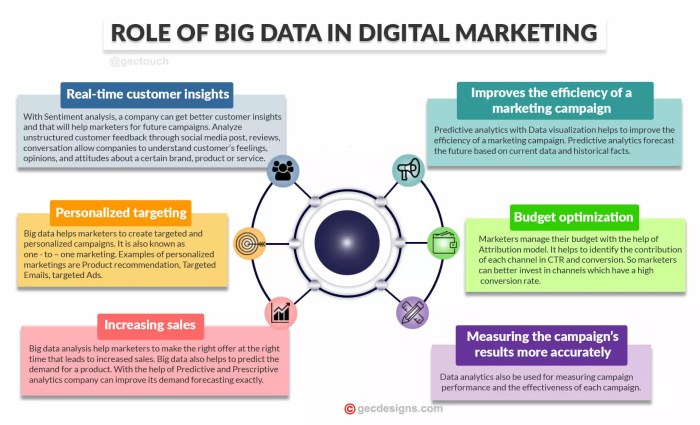The Impact of Big Data on Digital Marketing Strategies is revolutionizing how businesses connect with their audiences. No longer relying on guesswork, marketers now harness the power of massive datasets to understand consumer behavior, personalize experiences, and optimize campaigns with unprecedented precision. This unlocks opportunities for targeted engagement, improved ROI, and stronger customer relationships, ultimately leading to sustainable growth and market leadership.
This exploration delves into the multifaceted ways big data transforms digital marketing, from hyper-personalized targeting and predictive analytics to enhanced CRM and the ethical considerations involved. We’ll examine how data-driven insights fuel smarter decision-making, optimize resource allocation, and ultimately empower marketers to achieve their objectives more effectively and ethically.
Data-Driven Targeting and Segmentation: The Impact Of Big Data On Digital Marketing Strategies

Big data has revolutionized digital marketing, empowering businesses to move beyond broad strokes and embrace hyper-personalized campaigns. This level of precision allows for more effective resource allocation, higher conversion rates, and ultimately, stronger customer relationships. By leveraging the vast amounts of data available, marketers can understand their audience with unprecedented depth, leading to more impactful and profitable strategies.The ability to deeply understand and precisely target individual customers is a game-changer.
This granular level of insight, previously unimaginable, allows for highly tailored messaging and offers, significantly improving campaign performance and ROI. It’s no longer about shouting into the void; it’s about having a nuanced conversation with each potential customer.
Audience Segmentation Methods Based on Big Data
Big data provides the fuel for sophisticated audience segmentation, allowing marketers to divide their target audience into smaller, more homogeneous groups based on shared characteristics and behaviors. This enables the creation of targeted campaigns that resonate deeply with each segment, leading to increased engagement and conversions. Different data sources contribute to this process, allowing for a multifaceted understanding of each customer.
| Audience Segment | Data Source | Targeting Method | Expected Outcome |
|---|---|---|---|
| High-Value Customers | CRM data, purchase history, website behavior | Personalized email campaigns, exclusive offers, loyalty programs | Increased customer lifetime value, improved retention rates |
| Potential Customers (showing interest but haven’t converted) | Website analytics, social media engagement, abandoned cart data | Retargeting ads, personalized email sequences, special promotions | Higher conversion rates, reduced cart abandonment |
| New Customers | Demographic data, signup forms, initial purchase data | Welcome emails, onboarding sequences, product recommendations | Improved customer onboarding, increased initial engagement |
| Inactive Customers | Purchase history, email engagement, website activity | Win-back campaigns, personalized offers, reactivation emails | Improved customer retention, recovery of lost revenue |
Buyer Persona Creation Using Big Data Analytics, The impact of big data on digital marketing strategies
Creating accurate and detailed buyer personas is crucial for effective marketing. Big data analytics significantly enhances this process by providing a wealth of information about customer demographics, behaviors, preferences, and motivations. This allows for the development of highly realistic and actionable personas that guide marketing decisions across all channels. Instead of relying on assumptions, marketers can base their personas on concrete data, leading to more targeted and effective campaigns.
For example, analyzing website traffic, social media interactions, and purchase history can reveal patterns and preferences that shape a comprehensive understanding of the ideal customer. This detailed knowledge can inform everything from product development to marketing messaging.
In conclusion, the integration of big data into digital marketing strategies is not merely a trend; it’s a fundamental shift towards a more intelligent, efficient, and customer-centric approach. By embracing data-driven decision-making and prioritizing ethical considerations, businesses can unlock a wealth of opportunities to build stronger relationships, optimize campaigns, and achieve sustainable growth in today’s competitive digital landscape. The future of marketing is data-driven, and those who embrace this reality will undoubtedly thrive.
Do not overlook the opportunity to discover more about the subject of creating a compelling digital marketing strategy that converts.
You also can investigate more thoroughly about building a successful digital marketing business with a remote team to enhance your awareness in the field of building a successful digital marketing business with a remote team.